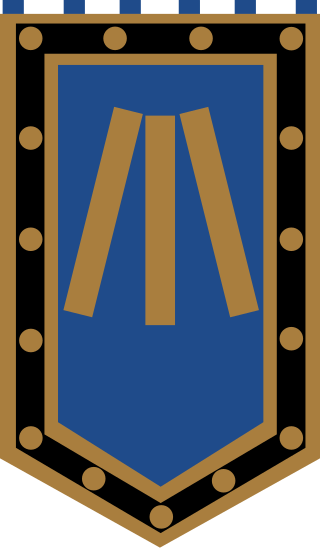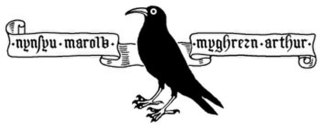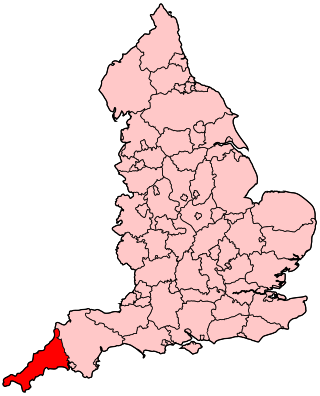Cornwall is a Celtic nation with a long musical history. Strengthened by a series of 20th century revivals, traditional folk music has a popular following. It is accompanied by traditions of pipers, brass and silver bands, male voice choirs, classical, electronic and popular music.

Gorsedh Kernow is a non-political Cornish organisation, based in Cornwall, United Kingdom, which exists to maintain the national Celtic spirit of Cornwall. It is based on the Welsh-based Gorsedd, which was founded by Iolo Morganwg in 1792.

The culture of Cornwall forms part of the culture of the United Kingdom, but has distinct customs, traditions and peculiarities. Cornwall has many strong local traditions. After many years of decline, Cornish culture has undergone a strong revival, and many groups exist to promote Cornwall's culture and language today.

The Federation of Old Cornwall Societies (FOCS) was formed in 1924, on the initiative of Robert Morton Nance, with the objective of collecting and maintaining "all those ancient things that make the spirit of Cornwall — its traditions, its old words and ways, and what remains to it of its Celtic language and nationality". The motto of the federation—as written on their web site—is "Cuntelleugh an brewyon ues gesys na vo kellys travyth", which translated into English is "Gather ye the fragments that are left, that nothing be lost". The motto in the OCS logo is the Cornish phrase King Arthur is not dead. The first Old Cornwall Society was established by Robert Morton Nance in St Ives in 1920.
Alfred Kenneth Hamilton Jenkin was a Cornish bard and historian with a particular interest in Cornish mining, publishing The Cornish Miner, now a classic, in 1927.

Brenda Wootton was a Cornish folk singer and poet and was seen as an ambassador for Cornish tradition and culture in all the Celtic nations and as far as Australia and Canada.
Philip John Payton is a British-Australian historian and emeritus professor of Cornish and Australian studies at the University of Exeter and formerly director of the Institute of Cornish Studies based at Tremough, just outside Penryn, Cornwall. An Australian citizen, he is professor of history at Flinders University in Adelaide, South Australia.

Michael Kenneth Paynter was a retired Cornish civil servant, trade union activist, and poet. Apart from a period of study at the University of Newcastle, he has lived in St Ives.
Wilfred Melville Bennetto (1902–1994) was a Cornish poet and novelist.
Julyan Holmes was a Cornish scholar and poet. Born in 1948, Holmes has worked on such topics as Cornish placenames, the Prophecy of Merlin of John of Cornwall, and the writings of the Penwith School.

Helena Sanders née Charles was a Cornish humanitarian, cultural activist, politician and poet. Sanders was the founder of the political party, Mebyon Kernow, in 1951. She was also well known for her feline welfare efforts in Venice.
Haldreyn is the bardic name of William Morris. He is a Cornish poet, linguist, and painter. Haldreyn was an original member of Kesva an Taves Kernewek and is a bard of the Gorseth Kernow, appointed in 1966.

Richard Garfield Jenkin, was a Cornish nationalist politician and one of the founding members of Mebyon Kernow. He was also a Grand Bard of the Gorseth Kernow.
Ernest George Retallack Hooper (1906–1998), also known by his bardic name Talek (broad-bowed), was a British writer and journalist from St. Agnes.
Jim Wearne is a Cornish-American singer-songwriter.
Loveday Elizabeth Trevenen Jenkin is a politician, biologist and language campaigner. She has been a member of Cornwall Council since 2011, and currently serves as councillor for Crowan, Sithney and Wendron.
The Cornish language revival is an ongoing process to revive the use of the Cornish language of Cornwall, England. The Cornish language's disappearance began to hasten during the 13th century, but its decline began with the spread of Old English in the 5th and 6th centuries. The last reported person to have full knowledge of a traditional form of Cornish, John Davey, died in 1891. The revival movement started in the late 19th century as a result of antiquarian and academic interest in the language, which was already extinct, and also as a result of the Celtic revival movement. In 2009, UNESCO changed its classification of Cornish from "extinct" to "critically endangered", seen as a milestone for the revival of the language.

The following outline is provided as an overview of and topical guide to Cornwall: Cornwall – ceremonial county and unitary authority area of England within the United Kingdom. Cornwall is a peninsula bordered to the north and west by the Celtic Sea, to the south by the English Channel, and to the east by the county of Devon, over the River Tamar. Cornwall is also a royal duchy of the United Kingdom. It has an estimated population of half a million and it has its own distinctive history and culture.
Presented below is an alphabetical index of articles related to Cornwall:
Dorothy Ann Trevenen Jenkin was a Cornish and British writer, teacher, librarian, and activist for Cornish independence. She was the first woman Grand Bard of Gorsedh Kernow and a founder member of Mebyon Kernow and its honorary president from 2011 until her death. Her bardic name was Bryallen, and she was Grand Bard from 1997 to 2000.







